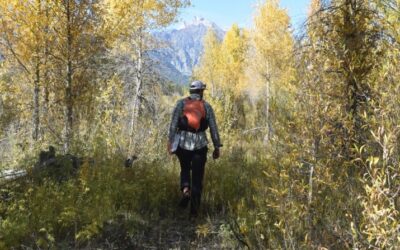The Supreme Court’s ruling on a case last week will affect hundreds of thousands of people in America. The high court on Thursday rejected the Trump administration’s attempt to end Deferred Action for Childhood Arrivals.
DACA has provided temporary legal status to roughly 700,000 people unlawfully brought to the United States as children. While it has not presented a path to citizenship, DACA has removed roadblocks for undocumented young people in the U.S., nicknamed “the Dreamers,” specifically when it comes to work visas and driver’s licenses. The program has also shielded these young people from deportation.
When she was eight years old, Bianca Infante’s parents brought her from Mexico to the United States. They spent a few years in Carson City, Nevada, before planting roots in Jackson. Infante, 24, says she knew she was undocumented from a young age. Her parents, she said, “always ingrained that in me.”
But Infante did not understand the weight of immigration status until she was a sophomore in high school. As her peers engaged in rites of passage emblematic of American youth, preparing to get their driver’s licenses, applying for part-time jobs, she learned that to be undocumented was to live life on the sidelines, a vulnerable observer.
“That’s when I knew I had to protect myself more, and pretend that I was like everybody else,” Infante said.
President Barack Obama announced DACA in June 2012 when Infante was 17. Even after she applied for the program, she still “tried to pretend” she was a U.S. citizen. If people found out the truth, she was afraid they would reject her, Infante said.
It was not until she began studying at the University of Wyoming for two bachelor’s degrees, in International Studies and Spanish, that Infante met more DACA recipients, and she began speaking out. First, she addressed UW students about her experiences as an undocumented person growing up in America for the university’s DACA symposium. The national immigrant advocacy organization Define American documented Infante’s story and broadcasted it across their channels too.
Infante, the first person in her extended family to graduate from college, did not stop there. Through DACA’s “advance parole,” which allowed DACA recipients to leave the U.S. for educational, humanitarian or employment purposes before it was suspended by the Trump administration in 2017, she visited Mexico, performed ethnographic research work and connected with family members.
“It made me want to do more. It made me want to be an advocate for everyone who has DACA status.” Because even with DACA, “we still feel like we need to hide,” Infante said.
Infante is focusing her master’s studies on immigration issues across the nation. For her thesis, she is zeroing in on Wyoming and looking at DACA recipients statewide, what they have achieved. She is contrasting that with the experiences of young people who could not apply for the program after the Trump administration rescinded it.
On Thursday when the Supreme Court handed down its decision, Infante was at the Laramie law firm where she is an intern, the Immigration Law Office of Travis Helm. She has been working there in preparation for her “overall goal”—to attend law school next fall and specialize in immigration law.
At the law firm that morning, Infante was in shock; she has been nervous since traveling to Washington D.C. in November when the Supreme Court heard arguments for ending DACA. She looked around the law office on Thursday and saw tears streaking the face of her boss Helm. And reality set in—the grim prognosis for DACA had not been realized. She and the law office staff spent an hour and a half discussing the decision, reading the Supreme Court opinion written by Chief Justice John Roberts, embracing, crying, talking about what the decision meant and what could happen next.
Just a few days prior, Infante had submitted her DACA renewal form, uncertain if it would be the last time. Although the program has not accepted new applicants since 2017, current recipients have been able to submit applications to renew their status, which expires every two years. Infante says she is relieved that her renewal is safe for now, but she worries about other undocumented young people who did not meet the requirements to apply. And she knows her temporary legal status could be just that.
“We really don’t know what’s going to happen. The reality is that Homeland Security can propose to try and stop DACA again,” Infante said.
Still, her hope is for the long-embattled federal DREAM Act (Development, Relief, Education for Alien Minors) to pass once and for all — “for there to be legal residency and a path to citizenship for all of us.”





